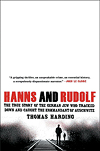
Hanns and Rudolf: The True Story of the German Jew Who Tracked Down and Caught the Kommandant of Auschwitz, by Thomas Harding, Simon & Schuster, New York, 2013, $26
This fine dual biography centers on Rudolf Höss (1900–47), a dutiful SS officer who rose in the Nazi concentration camp bureaucracy to direct its largest extermination camp. Journalist and documentary filmmaker Thomas Harding stretches to weave in the narrative of his great-uncle Hanns Alexander (1917–2006), although Alexander’s background—from his childhood in a prosperous Jewish family that lived for years under Nazi persecution to his command of a British intelligence unit that captured Höss in 1946—makes for a valid juxtaposition.
Höss was only 14 at the outbreak of World War I but managed to enlist. Wounded several times, he ended the war as the German army’s youngest noncommissioned officer. Joining the paramilitary Freikorps Rossbach, he participated enthusiastically in Germany’s postwar turmoil and joined the Nazi Party in 1922. Soon after Adolf Hitler’s rise to power in 1933, an old acquaintance, Heinrich Himmler, urged Höss to join his department.
In 1934 Höss was assigned to the newly established concentration camp at Dachau, Germany, proving a superb administrator and rising steadily in the ranks. In 1940 he went to Poland to build a new facility at Auschwitz, where he spent most of the war. Loyal and tireless, he overcame chronic supply and personnel shortages to make the camp a “success.” Readers will squirm at the gruesome events that occurred under his watchful eye while his growing family lived comfortably within sight of the crematorium. In postwar interviews and his autobiography Höss professes sorrow for his actions, but there is no evidence of it while he was on the job.
Turning to Hanns Alexander, Harding emphasizes that prewar German Jews were largely assimilated and not particularly religious. They considered themselves loyal Germans, so the avalanche of anti-Semitism after 1933 came as a shock to most of them. Many considered it a temporary aberration and delayed emigrating until it was too late.
Hanns’ family, however, made it out just under the wire. A wealthy Berlin physician in 1933, Hanns’ father counted Germany’s leading cultural and political figures as patients. By the time he fled to Britain in 1936, he was penniless and forced to return to medical school to requalify.
At the outbreak of war Hanns, then working in a London bank, enlisted and served throughout the conflict. At war’s end he was unexpectedly transferred to a small British unit assigned to find Nazi war criminals. Taking up his job with enthusiasm, Alexander caught the vicious Nazi Gauleiter of Luxembourg and then, mostly by threatening Höss’ wife and son, tracked down Höss, who was working as a farm laborer. Authorities sent Höss to Poland for trial and execution. Alexander lived a long life as a British subject.
Psychopaths (defined as people entirely without empathy) make irresistible biographical subjects, so readers will remain glued to the page for Höss’ half and will find Alexander an admirable example of how German refugees rebuilt their lives.
—Mike Oppenheim




